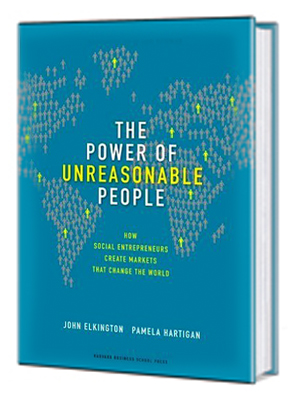“The reasonable man adapts himself to the world,
the unreasonable one persists in trying to adapt the world to himself.
Therefore all progress depends on the unreasonable man.”
~ George Bernard Shaw, “Man and Superman“(1)
 “The Power of Unreasonable People,” published by Harvard Business Press, takes its title from the above George Bernard Show quote. Its subtitle is “How Social Entrepreneurs Create Markets that Change the World.”
“The Power of Unreasonable People,” published by Harvard Business Press, takes its title from the above George Bernard Show quote. Its subtitle is “How Social Entrepreneurs Create Markets that Change the World.”
While “The Power of Unreasonable People” focuses on social entrepreneurship, using techniques learned from business and the power of free markets and capitalism to create positive change(2), many of the thoughts apply to entrepreneurship in general.
Characteristics of Social Entrepreneurs
1. Shrug off constraints ideology
2. Identify/apply practical solutions
3. Innovate
4. Focus first and foremost on social value creation, share insights freely
5. Jump in before being fully resourced, i.e. begin confident they will find a way along the way
6. Unwavering belief in innate capacity of others
7. Dogged determination pushes them to take risks others wouldn’t dare
8. Balance passion for change with zeal to measure and monitor their impact, i.e. it’s not enough to care, must care effectively; guilt assuaging, “feel good” effort not enough, must create meaningful results
9. Have a great deal to teach change makers in other sectors
10. Display healthy impatience (don’t do well in bureaucracies)
Authors John Elkington and Pamela Hartigan say that social entrepreneurs are “can-do thinkers, frustrated by don’t-do, can’t-do and won’t-do people” and that the power of entrepreneurs “derives from the fact that they spot dysfunction in the current system, and unlike reasonable people who accommodate themselves to the status quo, they work out how to transition the system…”.
I first heard the “all progress depends on the unreasonable man” quotation many years ago and since have been enamored of the concept of the disruptive change agent, the boat rocker who desperately (if occasionally ineptly) sees a better way to a better world and so fervently wishes to create positive change. (While conceding it is not always easy to differentiate at the extreme, I do sharply distinguish between the boat rockers with constructive intents/agendas vs. malcontents/anarchists whose sole goal is trouble making.)
It is important that we as a society remain open to positive change, that we remain flexible and adaptable. It is too easy to hunker down in our comfort zones, to be couch potatoes whose highest ambition is to own the widest flat-screen on the block, stirring from our humidity-controlled, air-conditioned abodes only to GPS-navigate our humongous SUVs to the closest fast-food feeding trough.
When the prevailing zeitgeist is “to get along, go along,” those who refuse to conform, those who illogically continue to resist far beyond any potential personal benefit, create incredible benefit for all of us.
The unreasonable among us, those who refuse to go along, those who create progress, stir change, rail and rant against the system, they are my personal heroes. I celebrate them, I cheer them on. For it is they who carry the banner of the unconquerable human spirit for all of us. It is they who move forward the far edge of humanity.
———————–
(1) Play written in 1903. The title comes from Friedrich Nietzsche’s philosophical ideas about the “Übermensch” (“Superman”). It is frequently translated as Superman or Overman, though there are problems with both of these. Nietzsche posited the Übermensch as a goal for humanity to set for itself in his 1883 book “Thus Spoke Zarathustra.” There is no consensus regarding the precise meaning of the Übermensch, or even the overall importance of the concept in Nietzsche’s thought. (Source: Wikipedia)
(2) See Elkington’s 1997 book, “Cannibals with Forks,” which introduces the term “triple bottom line” (financial, social, environmental).

